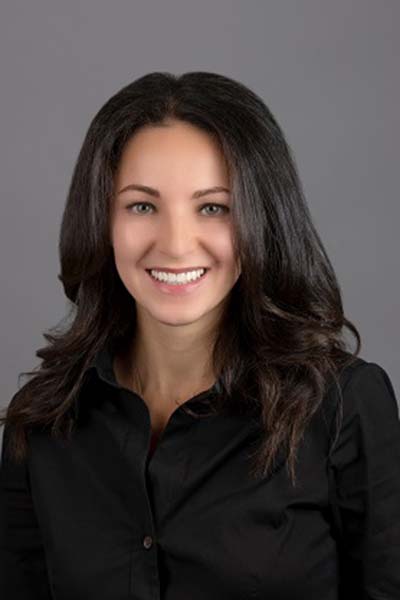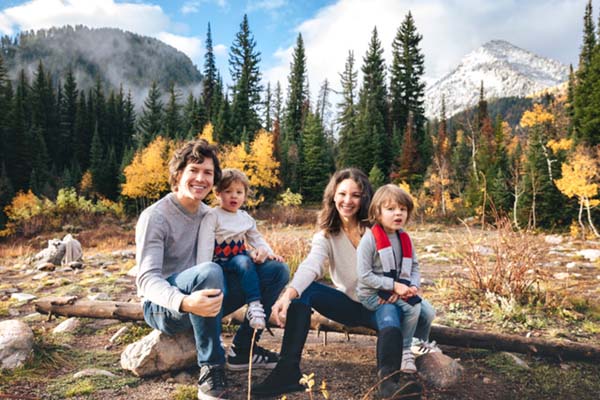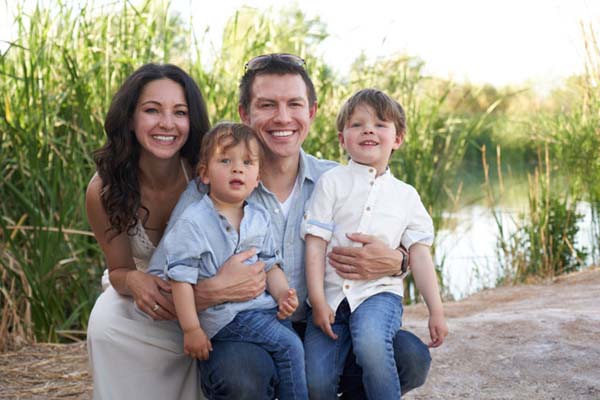Dr. Bogdana Schmidt, MD, MPH trained at University of California, San Francisco and completed a urologic oncology fellowship at Stanford. She joined the Section of Urologic Oncology in October, and will be providing care at the Huntsman Cancer Institute and the Salt Lake City Veterans Medical Center. She has a special interest in bladder cancer clinical care and surgery, as well as outcomes research.
 Q: What made you decide to accept a position at University of Utah and Huntsman Cancer Institute in urologic oncology?
Q: What made you decide to accept a position at University of Utah and Huntsman Cancer Institute in urologic oncology?
I was very excited about the opportunity to join the University of Utah and HCI! Working here allows me to take care of a large referral base of patients from diverse backgrounds, work with incredible colleagues, and participate in cutting-edge research. I think the dedicated and motivated people working here truly make the place special and I am privileged to be here!
Q: You emphasized a special interest in bladder cancer care and research? Where do you think the field needs to go and what are you hoping to accomplish in your career?
Bladder cancer is a big challenge in urologic oncology. There are over 80,000 new cases with over 17,000 deaths per year in the United States alone. The survival is highly dependent on the depth of invasion, and we know that the cancer can progress from superficial to invasive and once it is metastatic the 5 year survival is a disappointing 5%.
We need improvements in every stage of bladder cancer care: better screening tools - because cystoscopy is not available in remote areas of this country and traveling for care is a burden on patients and can delay accessing care; better biomarkers to predict which patients will progress from non-invasive to aggressive disease. We need to improve how patients recover after surgery, because despite advances with robotic surgery and enhanced recovery pathways, the readmission rate following radical cystectomy can approach 60%.
We need the ability to provide personalized care and that will require a lot of advances. It’s certainly daunting to work on bladder cancer, but our patients need us to do better and with innovations in imaging, biomarkers, and immunotherapy - it’s an exciting time!
Q: Gender equity has been an issue that has the attention of everyone in surgery, what do you think are the steps that need to be taken to create gender equity within urology?
Attention is great – but that’s only the beginning. I think the word “equity” is important – because just increasing the number of women in surgery is not enough. I was lucky to work with incredible women urologists, Dr. Kirsten Greene (department chair at University of Virginia) introduced me to urology and showed me that a woman can be a caring physician, an outstanding surgeon, an innovator and can do it all in high heels! In fellowship, I trained with Dr. Eila Skinner (department chair at Stanford University), who is a world-renowned expert in bladder cancer, an academic leader, and a mother to three children. Seeing women in these roles was inspiring to me, and I hope my presence in the field can do the same for future trainees.
As of 2019, women make up over 50% of medical school graduates, and only 10% of urologists, and when we look at women in leadership positions - only 6 department chairs/division chiefs of U.S. programs are women.
Certainly, there are internal factors that may discourage women from pursuing a surgical career - surgical training is long, demanding, and overlaps with reproductive years. A recent study demonstrated that women surgeons are more likely to delay pregnancy, use assisted reproductive technology, undergo nonelective C-sections and suffer pregnancy loss compared to women who are not surgeons and undoubtedly that is a problem!
Still, we know of numerous studies in medicine and surgery that objectively demonstrate that women are excellent physicians (in fact, women internists caring for elderly patients had significantly improved hospital mortality and readmission rates!) but if we don’t create an environment in which women can thrive in surgery and urology, our patients will miss out on fantastic clinicians and our field will suffer from lack of diverse perspectives. If you’re asking me if this is a problem – YES, it is!
To see greater equity in urology we need to work on all fronts. We need more women in leadership roles that younger generations can access for mentorship, we need greater visibility for women succeeding in innovation, research, education, and clinical care to highlight the numerous ways women enrich this field, we need to pay women fairly for their work, and we need to provide flexibility for them in their career advancement that acknowledges the increased burden women bear for caregiving in our society.
 Q: Your husband is also a physician. How do you manage to balance home life with children in a two-physician family?
Q: Your husband is also a physician. How do you manage to balance home life with children in a two-physician family?
Well to start, we don’t try for balance. Maybe this is an unpopular opinion, but I think balance in modern life with its myriad of distractions and pressures is an illusion. We focus on being present. When we are at work, we are present with our patients and our colleagues and try to do our best. When we are home, we try to ensure our kids have our attention. We help each other check off all the boxes (making lunches, setting out clothes, cooking, cleaning, etc.) and we try to make sure that while one of us is doing something that needs to get done the other can be fully present with our boys. We try to be kind to ourselves and each other – but it’s often challenging, and some days can be tough. The wonderful part about having a physician husband is that he understands that my career is a huge part of who I am, that my schedule can often be very demanding, and that I will have some tough days. I am very lucky.
Q: Many people enjoy lots of different aspects of life in Utah, what are you most excited about?
about?
Now we are getting to the good part! As I mentioned, I have two boys (age 2 and 4) and we are really excited about the winter! Last year when I was interviewing for this job, I had to bring my boys with me because securing childcare at the height of the Covid pandemic was impossible. We took the boys hiking, got them skiing, and really enjoyed being here. So far, we have explored the Canyons and the Uintas and we are very much looking forward to the winter here!